Can the ‘fringe’ make the BJP cringe?

The outrage against the deplorable comments by two now-suspended and expelled members of India's ruling Bharatiya Janata Party (BJP) against Prophet Muhammad continues to spread among the Islamic countries. At home, too, the BJP faces a barrage of criticism from the main opposition Congress. The controversy saw several days of protests, at times marred by arson and violence in several Indian states, and two individuals were killed during clashes with police in Ranchi, the capital of Jharkhand state. The protests were confined mostly to urban areas. The protesters repeatedly called for the trial and punishment of former BJP spokesperson Nupur Sharma and her party colleague Naveen Kumar Jindal.
A number of cases have already been filed in Delhi, Mumbai and Kolkata against both Sharma and Jindal on charges of inciting communal tensions and hurting religious sentiments of Muslims. One also came across an instance of a protester talking about beheading Sharma and a youth uploading a simulated photo of her beheading on social media. There is recognition among the Muslim community that the talk of beheading and violence affected the protests based on the issue at stake. So, a number of Islamic outfits rightly called for peaceful protests.
On the other hand, in a deeply worrying sign, the Yogi Adityanath government in Uttar Pradesh used bulldozers to flatten the houses of some of the people allegedly involved in the violent protests against the anti-Prophet remarks in Saharanpur, Kanpur and Prayagraj (formerly Allahabad). In the case of demolition in Saharanpur, the local authorities claimed that the houses had been constructed without approval by the civic bodies concerned. But Additional Superintendent of Police of Saharanpur Rakesh Kumar had a different take on it when he said the police were taking "strict action" against the accused involved in violence on June 10, and on properties they amassed through "illegal means."
Concerned over what has been called "bulldozer politics," six former judges of the Indian Supreme Court and various High Courts and six senior advocates have appealed to the Supreme Court to take suo motu cognisance of the acts of demolition of the residences of those who protested in Prayagraj against the objectionable remarks made by the former BJP leaders. "Such a brutal clampdown by a ruling administration is an unacceptable subversion of the rule of law and a violation of the rights of citizens and makes a mockery of the constitution and the fundamental rights guaranteed by the state," said the hard-hitting letter. Even assuming that the houses were illegal constructions, the crucial question is: Why act against them now? Secondly, even if they are illegal, there is a well-established legal route of serving notice to the house owners and moving a court of law before demolition.
What emerged from the entire row is about reported churnings within the BJP with murmurs of discontent being voiced by the hardcore constituency of the party, which feels that Nupur Sharma, suspended from primary membership, and Naveen Kumar Jindal, expelled from the party, had been left in the lurch by the party top brass. While Sharma made the remarks during a TV debate, Jindal had tweeted his comments.
Two questions that have been raised by the disciplinary action against Sharma and Jindal are: 1) Why did it take the BJP leadership to act against them nine days after they had made the controversial remarks? 2) Why did the party take the step if the duo had represented the rabidly hardcore Hindutva face of the party?
It is not the first time that the hot heads within the BJP and other Hindutva outfits, like Vishva Hindu Parishad (VHP) and Bajrang Dal, have made what has come to be known as "hate" speeches. There have been a number of instances of it in the past; one still remembers the "termites" expression used by Home Minister Amit Shah in describing "illegal" immigrants from Bangladesh to India.
Assuming that the disciplinary action taken against Sharma and Jindal was primarily under pressure of the blowback from Islamic countries, particularly those in the Persian Gulf, it tends to question the sincerity of the BJP in cracking down on such elements. This view is being aired both within the hard-line sections of the party and outside. Most importantly, the developments reflect resentment within the BJP on rhetoric, ideology and rewards. In the past, no action was taken against the party leaders who had made inflammatory speeches – some of them were given assembly poll nominations. Did it require the BJP to wait to act against Sharma and Jindal till it became an international diplomatic issue?
A total of 20 Islamic countries have so far protested against the remarks by Sharma and Jindal, but it is interesting that the Indian Ministry of External Affairs (MEA) pushed back against only the Organisation of Islamic Cooperation (OIC) and Pakistan. The MEA has said that the controversial remarks do not, in any manner, reflect the views of the government of India. A spokesperson of the Indian Embassy in Qatar, where the host government had summoned Indian Ambassador Deepak Mittal and handed him a protest note, said that "these are the views of fringe elements."
Interestingly, in the midst of raging protests against Sharma and Jindal, Iran's Foreign Minister Hossein Amir Abdollahaian paid a three-day official visit to India, meeting Prime Minister Narendra Modi, External Affairs Minister S Jaishankar and National Security Adviser Ajit Doval. It was the first ministerial-level visit from the Gulf and must have been a reassuring signal to New Delhi about its ties with the region.
Is it a coincidence that the major diplomatic row broke out on a day when India's Vice-President M Venkaiah Naidu reached Qatar on an official visit, during which he called on Sheikh Hamad bin Khalifa Al Thani, father of the emir of Qatar, and then held delegation-level talks with Sheikh Khalid bin Khalifa bin Abdulaziz Al Thani, prime minister and minister of interior of Qatar?
Given the robust trade ties India has with Gulf countries and India's dependence on some of them for its oil and gas needs, the reason why the BJP had to act against Sharma and Jindal appears more economic than political. Nearly 6.5 million Indians are working in Gulf countries. In 2020-2021, the total value of India's trade with the Gulf countries was worth over USD 87 billion, which included total imports worth nearly USD 60 billion.
Since becoming prime minister for the first time in May 2014, it was Narendra Modi who has taken extra efforts to strengthen ties with West Asian countries. Post-Covid, Modi undertook his first international visit this year by going to the UAE and Kuwait in January. Modi has been a regular visitor to the Gulf region, having visited many of the countries several times in the last eight years. Can his efforts be wasted by "fringe" elements?
The question is: Can the "fringe" be a credible defence against Sharma, who was the BJP's national spokesperson, and Jindal who had been the media in-charge of the party's Delhi unit? No doubt, Sharma and Jindal are ultra political lightweights in the BJP, but their status as the articulators of the party's views in public could not be lost sight of. In politics and in public life, people should exercise utmost restraint in what they do and say in public.
It has been noted that the words "fringe elements" used by the Indian Embassy spokesman in Doha after Mittal was summoned by that country's foreign ministry never found any mention again in any reactions by the MEA on the issue. Implicit in it is the recognition that "fringe" could not be an escape route out of a messy situation.
The BJP in a statement said, "The BJP respects all religions. The BJP strongly denounces insults of any religious personalities of any religion. The BJP is also strongly against any ideology which insults or demeans any sect or religion. The BJP does not promote such people of philosophy."
It said, "India's constitution gives the right to every citizen to practise any religion of his/her choice and to honour and respect every religion. As India celebrates 75th year of its independence, we are committed to making India a great country where all are equal and everyone lives with dignity, where all are committed to India's unity and integrity, where all enjoy the fruits of growth and development."
A section in the BJP would like the party's rank and file to view the action against Sharma and Jindal in a much larger context that is evolving in the BJP and its spiritual mentor RSS. According to some Indian media reports quoting an unnamed senior BJP leader, the prime minister has sought to create a narrative of inclusive development through "Sabka saath, sabka vikas, sabka vishwas" slogan, and the party's role is to build on it and anything that hurts this process would be considered as "indiscipline."
Secondly, going public for the first time on the controversy over the Gyanvapi mosque in Varanasi, RSS head Mohan Bhagwat recently spoke to RSS cadres in Hindi, whose translation according to the Indian Express reads, "One should not raise a new issue every day. Why escalate fights? In Gyanvapi, our faith has been there for generations. What we are doing is fine. But why look for a Shivling in every mosque? What happens in mosques is also a form of prayer. Okay, it (Islam) has come from outside. But Muslims (in India) who have accepted it are not outsiders, they need to understand this. Even if their prayer is from outside (this country), and they wish to continue with it, we are fine with it. We are not opposed to any form of worship."
What do Bhagwat's remarks mean? Is he signalling that with fresh general elections two years down the line, the Sangh Parivar wants to avoid confrontational politics on the streets on any divisive issue?
When it was in the opposition, the BJP's core Hindutva agenda helped its march to power in India on the back of Ayodhya temple movement and other issues even as the party got the anti-minority tag. There is a feeling in the party that the BJP must live down its image of a "natural party in the opposition" and replace Congress as the "natural party for governance" after the latter's long stint in power.
Pallab Bhattacharya is a special correspondent for The Daily Star. He writes from New Delhi, India.

 For all latest news, follow The Daily Star's Google News channel.
For all latest news, follow The Daily Star's Google News channel. 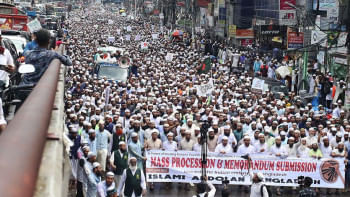
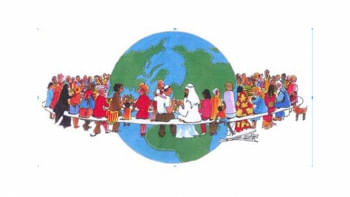
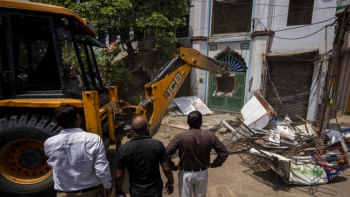
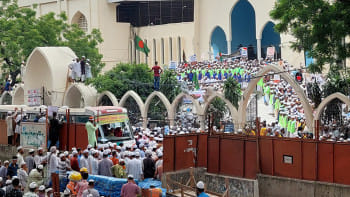
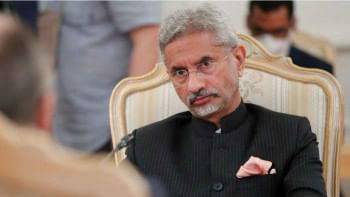
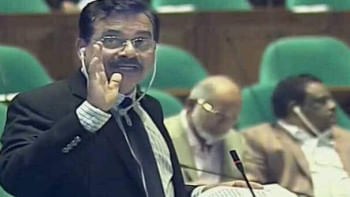

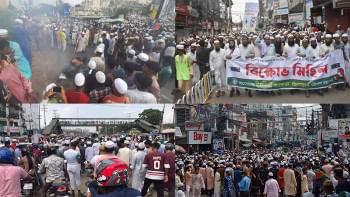


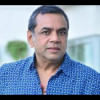



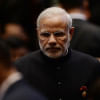

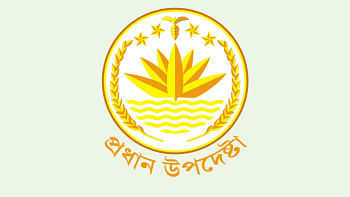
Comments